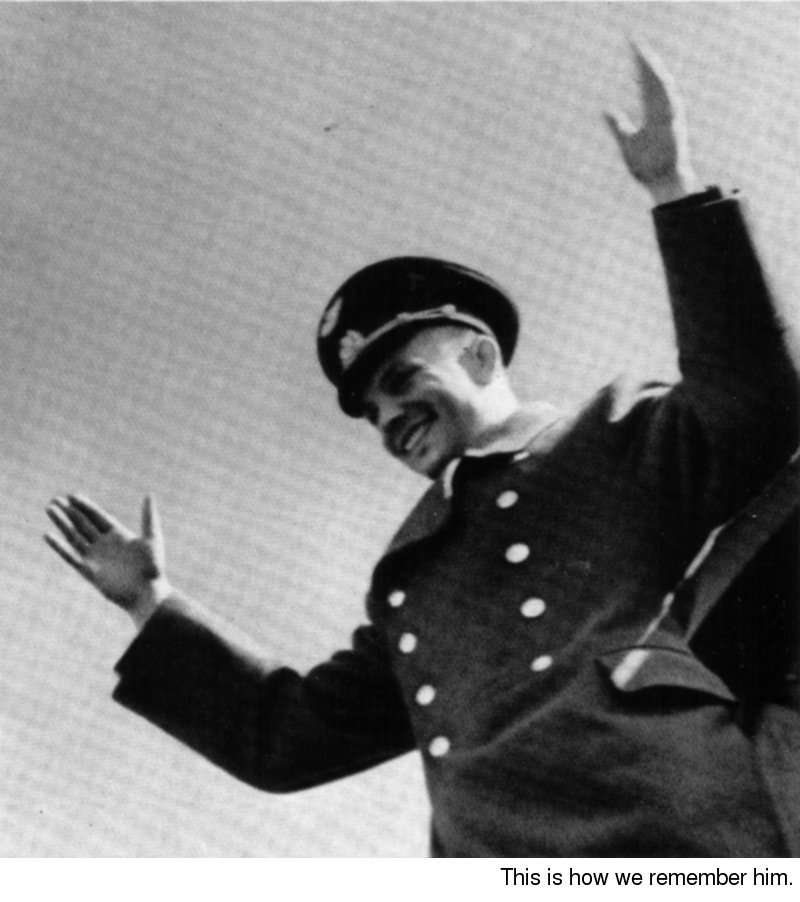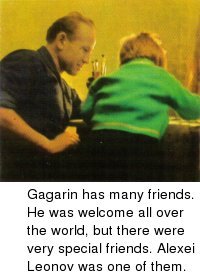Yuri Gagarin is no longer with us.
A phone call summoned me to the press room in the middle of the night. I could tell by the editor's voice that it was something bad. I rushed out to my car, then hurried up the stairs and along the deserted corridor. The presses were still, but everyone who had been on duty that night had stayed on. The editor was speaking on the phone.
"No. There's no hope. He was killed," he said and hung up.
How? Where? What had happened? Perhaps it was all a mistake? We sat around in silence, staring dully at the big clock, watching the movement of the large black hands. I heard the news again over the car radio that morning. It was news one simply did not want to believe.

I first heard the name Gagarin seven years before as I was driving along one morning. People were standing around in groups on the street. Some of them asked me to stop and open the car door so that they could hear the broadcast. What exactly had that young man from Gzhatsk done? Then it was ten o'clock of another spring morning, and the name coming over the radio was the same: Yuri Gagarin. Again I was asked to stop my car and turn the volume up. And the same questions were asked: What? Where? How had it happened?
People all over learned that Yuri Gagarin was dead. Everyone knows that life does not only consist of good news. But Gagarin ... It was impossible.
The piles of telegrams in the press room were growing. The music coming over the air wrenched your heart, while the sparrows fluttering in the puddles and the starlings singing seemed jarringly out of place. There is not a home in the country in which the people did not heave a sigh or shed a tear. The man who is no longer with us was a part of something very big that unites us all.

He was a Russian, and every Russian was proud, seeing in him the finest traits of his nation. Yet, he was the son of all people, of Georgians, Latvians, Frenchmen, Arabs and Uzbeks. All were equally proud of him, because he was a Man and thus represented all of mankind in its first step into the unknown. We who live in the USSR had a right to be doubly proud, for he was a Soviet man, the embodiment of the best qualities of a Soviet person. The world, as it looked into his face, actually had a good look at all Soviet people. That meant it gained a better understanding of us all. His smile expressed the spirit of his people. His cause was the cause of his people. That was why Gagarin's name captivated the world so quickly, and that is why there is not a single home on Earth where the sorrow of our loss is not shared today.
So much has been said about the cause to which he devoted his life that there is no need to repeat the events of his starry hour that morning of April 12, 1961, nor of what has become possible and understandable, too, as a result. Ships ply the Atlantic. So much of importance has happened on these perilous sea routes in the last five hundred years. Yet, when we speak of America we first recall Columbus, the discoverer of the New World. Gagarin's place in history will be the same. People will become accustomed to his name appearing together with those of Columbus and Magellan.
We shall name new streets in his honor, we shall probably name a city after him, and it will be worthy of his name. We shall erect a monument to him made of the most lasting metals, this for the people of tomorrow. But only yesterday we still knew Yuri Gagarin, the living man. We knew his manner of speaking, his smile. Someone had seen him pulling on his flying helmet for the last time before climbing into the cockpit. His wife remembers his last words to her. Someone received a letter from him yesterday, while another might still be in the mails.
He was a good man. I saw him on numerous occasions and was friendly with him. I recall the trim major running down the wooden staircase in the house on the bank of the Volga the day after his spaceship landed. I recall the joy and surprise on the major's face as he looked at the first pictures in the newspapers.
Seven years of fame did not change Gagarin. Many did not suspect the hard lot that had fallen to him. There was his work, his family, his studies and being always in the limelight. There was the insatiable interest people took in him and which was so often exhausting. Gagarin carried this weight honorably and with dignity, as a true man and a Communist. He could not always reply to all requests in the affirmative. He often had to say "no" to us newspapermen, too, but he always did this tactfully and kindly. He could speak equally well to the Queen of England and to an old peasant woman who, I recall, recognized him on the road near Yaroslavl and came over, crossing herself, "to have a look at Gagarin". His winning smile of a good-natured Russian man was a great aid to him. In watching him I could never help wondering at the wisdom of the choice that had been made in April 1961.
Another reason we all feel so close to Gagarin is that in the thirty-odd years of his life we shared a common lot. This meant a childhood of meager rations, patched clothes and studying by the light of a kerosene lamp, and growing up in the postwar years, when young Komsomol members led a busy and exciting life, helping to rebuild the war-ravaged country. This meant a maturity in which one's convictions made a man a Communist. Gagarin was one of us. This explains the sincerity of our love for him and the sincerity of our grief as we stand with bared heads at his grave.
He died in a plane crash. He who had braved the risk and danger of a space flight seven years ago returned to the earth unscathed. What, then, could possibly happen to him on the ground or even a bit higher? This was what so many probably thought and what Gagarin himself probably thought. Perhaps that is why we feel somehow guilty today. Could we have in some way prevented his death? Then again, knowing that a person can be killed on an icy street, which of us will stay at home on a frosty day? You can't fence yourself in. A man cannot let himself be swathed in the cotton of overprotection, no matter how precious his life may be to others. Gagarin, above all, did not want to change his ways, and this could not be disregarded. He was constantly in the air and spoke of new flights. Had anyone the right to forbid him this?
Our loss is great. Yet, as in time of war the death of our comrades added new strength to the survivors, today our grief will not stop our forward movement.
